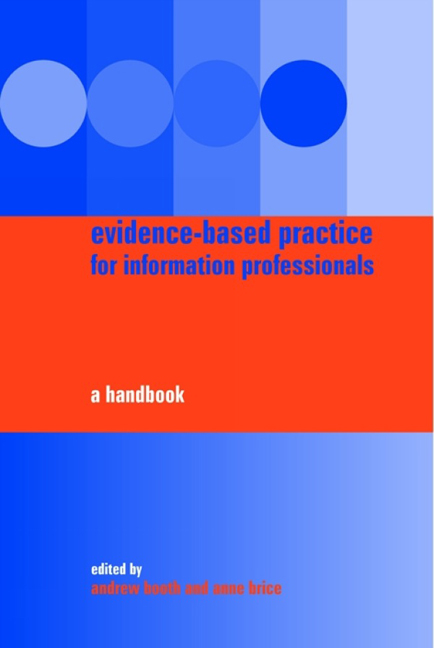Book contents
- Frontmatter
- Contents
- Foreword
- Editors and contributors
- Part 1 The context for evidence-based information practice
- Part 2 Skills and resources for evidence-based information practice
- Part 3 Using the evidence base in practice
- 13 Six domains of evidence-based information practice
- 14 Examining the evidence base for reference services and enquiry work
- Special Topic (A) Provision of a current awareness service for research staff (Guideline)
- 15 The contribution of evidence-based practice to educational activities
- Special Topic (B) How can I train my users? (Evidence Digest)
- 16 An evidence-based approach to collection management
- Special Topic (C) Electronic or paper: how do I manage my journals collection? (Evidence Digest)
- 17 Towards evidence-based management
- Special Topic (D) How do I measure the impact of my service? (Guideline)
- Special Topic (E) Should I charge and, if so, what should I charge for? (Evidence Briefing)
- 18 Evidence-based perspectives on information access and retrieval
- Special Topic (F) What are the characteristics of a good searcher? (Critically Appraised Topic)
- Special Topic (G) Which database, which interface? (Guideline) 251
- 19 Introducing an evidence-based approach to marketing and promotional activities
- Special Topic (H) Determining the information needs of practising nurses postregistration in the UK from 1990 to 2003 (Evidence Digest)
- 20 A future for evidence-based information practice?
- Index
Special Topic (H) Determining the information needs of practising nurses postregistration in the UK from 1990 to 2003 (Evidence Digest)
from Part 3 - Using the evidence base in practice
Published online by Cambridge University Press: 08 June 2018
- Frontmatter
- Contents
- Foreword
- Editors and contributors
- Part 1 The context for evidence-based information practice
- Part 2 Skills and resources for evidence-based information practice
- Part 3 Using the evidence base in practice
- 13 Six domains of evidence-based information practice
- 14 Examining the evidence base for reference services and enquiry work
- Special Topic (A) Provision of a current awareness service for research staff (Guideline)
- 15 The contribution of evidence-based practice to educational activities
- Special Topic (B) How can I train my users? (Evidence Digest)
- 16 An evidence-based approach to collection management
- Special Topic (C) Electronic or paper: how do I manage my journals collection? (Evidence Digest)
- 17 Towards evidence-based management
- Special Topic (D) How do I measure the impact of my service? (Guideline)
- Special Topic (E) Should I charge and, if so, what should I charge for? (Evidence Briefing)
- 18 Evidence-based perspectives on information access and retrieval
- Special Topic (F) What are the characteristics of a good searcher? (Critically Appraised Topic)
- Special Topic (G) Which database, which interface? (Guideline) 251
- 19 Introducing an evidence-based approach to marketing and promotional activities
- Special Topic (H) Determining the information needs of practising nurses postregistration in the UK from 1990 to 2003 (Evidence Digest)
- 20 A future for evidence-based information practice?
- Index
Summary
Why is it important?
Studies investigating the information needs of healthcare professionals have tended to focus on medical staff (Bunyan and Lutz 1991; Roddham 1995). Nurses learnt on the wards, which discouraged the use of research in practice (Wakeham et al., 1992) and led to the belief that nurses had no need of libraries (Wakeham 1992).
Since the early 1990s, the UK nursing profession has undergone radical changes that are expected to increase nurses’ requirement for information and libraries (Roddham 1995; Yeoh 2000). These include the introduction of a more scholarly base for nursing (UKCC 1986; UKCC 1999), increasing emphasis on continuing professional development (UKCC 1994), the growing evidence-based healthcare movement and the extended role of nurses (Yeoh 2000).
Technological developments such as the internet and the NHSnet, and initiatives including the National electronic Library for Health (Yeoh 2000) and the increasing focus on electronic delivery of information are expected to impact on the information needs and information-seeking behaviour of practising nurses.
What is required?
Many NHS Trust libraries traditionally have provided services to a narrow range of clients, predominantly physicians and junior doctors in training (Capel 1998). Government initiatives to encourage NHS libraries to take on a multidisciplinary focus (Department of Health, 1997), coupled with the move of nursing education to the higher education sector (UKCC, 1986), have meant they are expected to provide services for different staff groups although they may have little experience or knowledge of their information needs.
Marketing techniques and strategies can be used to evaluate existing services and to plan new services (Bunyan and Lutz 1991). Products and services to meet the needs of a particular client group can then be developed and promoted.
The information needs of nurses are diverse, as the profession encompasses a variety of specialities including general, psychiatric, community, midwifery and children's nursing (Bawden and Robinson 1994). Nurses may work in acute care or within the community and, in addition to their role as carer, may undertake other roles including those of teacher, student, researcher or manager (Roddham 1995; Urquhart et al., 1997).
- Type
- Chapter
- Information
- Evidence-based Practice for Information ProfessionalsA Handbook, pp. 272 - 278Publisher: FacetPrint publication year: 2004



